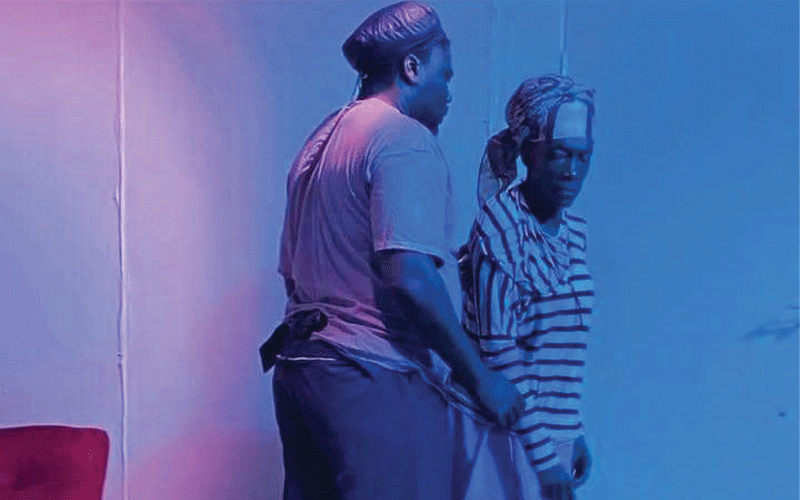
The play titled Zuva Crumbling premiered recently at the Reps Theatre is relieving memories of the 1990s food riots that were orchestrated by University of Zimbabwe students.
The play, which was written by British-Tanzanian actor Lucian Msamati, featured a star-studded cast of locals who included Charmaine R Mujeri, Jasen Mphepo, Tafara Nyatsanza, Tinevimbo Chimbetete and Tafadzwa Bob Mutumbi.
Mutumbi was also the play director.
The play is a gripping and emotional tale centred on the University of Zimbabwe students during the 90s, a time when food riots were common in the country.
It tells a story of five university friends who were brought together by a common cause which was to fight injustice, but through authority interventions and choices, the quintet went separate ways.
Thirteen years later, the friends are reunited, but this time only four of them by a common ghost who turns out to be their friend who went missing during the peak of the riots.
Msamati who attended the premiere of the play virtually told Standard Style that the play was based on real life events which he experienced while he was studying at the .
“The violence and trauma shown in the play, I went through it as I was at the UZ by that time, but I think over time what I have learnt to do is to able to filter whatever pain and rage I was feeling through the characters,” said Msamati.
- Education 5.0: Blessing or curse for UZ students?
- UZ in fees shocker
- Deliver free education, govt told
- Police break up UZ protests
Keep Reading
“I cannot praise the team and the actors enough.
“I had not looked at this play for a better part of nearly 10-12 years.
“It was out of my memory and re-engaging with it when Bob got in touch with me, I felt emotional and I thought I can do it even better as I am older, wiser and a better artist now.
“The greatest gift has been watching the cast respond to the new offerings which were so much more intense and clearer.”
Commenting on the play, most of the attendees said it was very emotional for them as they experienced the violence that took place during the riots.
Some were even in tears during the play where the character Mai Tinashe was explaining how she was brutally raped by officials and how her husband died on the very same day.
“The play is raw and powerful, it is throwing Zimbabwe’s underside straight in everyone’s face,” said Tony who was among the audience.
“It was so emotional as it speaks to most of us who have been through it.
Zane Lucas said the most difficult period ranged from the late 1990s into the new millennium.
“In 1998 when I came back to the country from school, a lot of University of Zimbabwe students were protesting on the streets against the late Robert Mugabe regime and I don’t think many students graduated that year,” said Lucas.
“I remember in 2001 when I was teaching, a friend of mine went for a peace match and was beaten, a lot of injustice was going on through the 90s and into the 2000s and we were all fighting for our rights as Zimbabweans and we still are.
“I am so glad this play has come back, and even though the director said it was not political everyone else said it is political because elections are coming up and because of the trauma that everyone went through, being beaten up because of whom then voted for was wrong and is still wrong.”
United Kingdom-based actress Chipo Chung said she had a hand in crafting the play.
“I directed a reading of this play in 2004 at my old school in London at the Royal Academy of Dramatic Art (RADA) which was around the time of the first draft and it was very much of the moment,” said Chung.
“Watching the play has made me see how of the moment it still is, it asks many questions about choices.
“I agree that it tells of the unprocessed trauma of those years, the people who suffered and became victims during the riots and even during wars.
“What I find challenging is that plays get made and they get forgotten and we do not get to pass on or build on top of.
“To have a play that captures so much of the vibrancy of the 90s and the sort of political energy and frustration is to be appreciated as the essence of it is so much more compact and clear.”
Mutumbi said he did not pick the play because the country is going for elections, but because to him it is a story which seeks to heal those who carry with them political baggage.
“This is a story about healing as we resonate with the people who were there experiencing and being victims during the riots,” he said.
“I think there is a lot of unresolved political trauma that we carry within ourselves.
“I picked this story not because we are facing elections, but because it is a healing story, I realised that as a people we have so much political baggage that we have not been talking about and this story is that conversation we are not having as a people.”
The play has been performed before in England where Msamati is now residing but facing a great challenge in trying to articulate a truth outside Zimbabwe.
“The greatest struggle I had when this play was done in England was trying to articulate a truth outside the country,” Msamati said.
“Everywhere you go people want to hear their version of the events and of Zimbabwe.
“The good thing in giving this play to a Zimbabwean company was I did not have to explain or translate anything.
“I did not have to water down anything.
“It is very difficult to explain complex human stories that are none white with black faces and voices because the world does not want to hear.”







